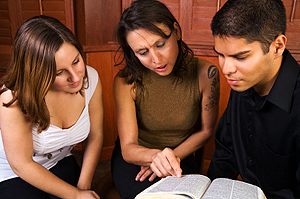[F]or in Christ Jesus you are all sons of God, through faith. For as many of you as were baptized into Christ have put on Christ. There is neither Jew nor Greek, there is neither slave nor free, there is no male and female, for you are all one in Christ Jesus. And if you are Christ's, then you are Abraham's offspring, heirs according to promise (Galatians 3:26-29).
At first listen through our twenty-first century ears, this translation of Paul's words to the Galatians appears exclusivist or sexist or at least gender limiting. That's why most modern translations change the phrase "you are all sons of God" to "you are all children of God" (Galatians 3:26). While the latter seems more inclusive in phrasing, it misses the radical point of Paul's original wording.
 In a world where most cultures granted the rights of inheritance only to the "right kind of son," Paul's declaration to the Galatians is a racial, social, and gender earthquake. His emphasis in this passage is on who is the "right kind of son." His answer is liberating.
In a world where most cultures granted the rights of inheritance only to the "right kind of son," Paul's declaration to the Galatians is a racial, social, and gender earthquake. His emphasis in this passage is on who is the "right kind of son." His answer is liberating.
The "right kind of son" is not based on race — "neither Jew nor Greek"!
The "right kind of son" is not based on social status — "neither slave nor free"!
The "right kind of son" is not based on gender — "no male or female"!
The "right kind of son" is now determined by faith in Christ Jesus as Lord (Galatians 3:26), baptism into a new identity and relationship with Christ (Galatians 3:27), and the presence of the indwelling Holy Spirit who gives each person access to the Father as a beloved child (Galatians 4:6-7) — these are the same three points of emphasis at Pentecost (Acts 2:22-41).
This standing as the rightful male heir (the "right kind of son") for every Christian is true regardless of race, regardless of social standing, and regardless of gender. The newly created person in Christ has the right to call out "Abba! Father!" with all of the full rights of the son who is the rightful heir to all of the Father's inheritance. As Paul announced to the Corinthians, a new creation had begun and we no longer look at people from a human point of view any longer (2 Corinthians 5:14-17).
Paul's declaration is sweeping and vast. It is full of promise and rich with implications that would take generations to work out in culture, but was present in the moment the first people called on the Lord to be saved, were baptized into Christ, and were given the gift of the Holy Spirit at Pentecost. This declaration is re-declared and fully realized each time those events of new creation occur in the life of a person in any age.
 What Paul said about race to the Ephesians, he also intended to be true with social standing and with gender:
What Paul said about race to the Ephesians, he also intended to be true with social standing and with gender:
For he himself is our peace, who has made the two groups one and has destroyed the barrier, the dividing wall of hostility... His purpose was to create in himself one new humanity out of the two, thus making peace, and in one body to reconcile both of them to God through the cross, by which he put to death their hostility. He came and preached peace to you who were far away and peace to those who were near. For through him we both have access to the Father by one Spirit (Ephesians 2:14-18)
Paul returns to this theme in several of his letters, extending the theme to all of Jesus' disciples — those who believe in Jesus, have been baptized into a new identity with Jesus, and have been filled with the Spirit — being heirs of God's promise and co-heirs with Christ, regardless of race, social standing, and gender:
For those who are led by the Spirit of God are the children of God. The Spirit you received does not make you slaves, so that you live in fear again; rather, the Spirit you received brought about your adoption to sonship. And by him we cry, "Abba, Father." The Spirit himself testifies with our spirit that we are God’s children. Now if we are children, then we are heirs — heirs of God and co-heirs with Christ, if indeed we share in his sufferings in order that we may also share in his glory (Romans 8:14-17; see also Titus 3:3-7)
 With his words to the Romans, Paul moves beyond his expansive you are "all sons of God... and heirs" to you are "heirs of God and co-heirs with Christ"! The human barriers and distinctions have all fallen away with the confession of Jesus, baptism into Christ, and the gift of the Holy Spirit. Before God, there is no distinction. We have equal access to the Father. We have equal value and are respected and cherished as God's children equally. Male and female both are equal heirs to God's promise and are co-heirs with Jesus!
With his words to the Romans, Paul moves beyond his expansive you are "all sons of God... and heirs" to you are "heirs of God and co-heirs with Christ"! The human barriers and distinctions have all fallen away with the confession of Jesus, baptism into Christ, and the gift of the Holy Spirit. Before God, there is no distinction. We have equal access to the Father. We have equal value and are respected and cherished as God's children equally. Male and female both are equal heirs to God's promise and are co-heirs with Jesus!
Yet that leaves some important dangling questions we must address if we are to be honest with the Scriptures and honest with ourselves.
If with Pentecost God brings into being a new humanity free of the distinctions that separate us, how far does this go in its implementation in our new life together in Jesus' church?Paul's declaration to the Galatians is a racial, social, and gender earthquake.Did Jesus value and empower others to serve beyond the distinctions that divided people in his day?Did the early church begin to empower people to serve in Jesus' Kingdom beyond the social distinctions of their day?
How do we apply these principles in our own day?
Over the next several weeks, we will try to humbly address these questions.
Special Note:
This is the fourth in a series of posts about how God values a woman and The Creator's plan for the people in Jesus' church to restore the Father's original intent through their life together.
In the first post — "Of Sacred Value" — we looked at God's creation of man and woman, both made in his image and both made of equal value.
In the second post — "Made to be Complements" — we saw how God created the male and the female to be complements of each other: each supplying what the other could not have without the other.
Last week's post — "Restoring the Creator's Intent" — we focused upon the birth of the church in Acts chapter 2 and how the key elements of faith in Jesus, baptism, the work of the indwelling Holy Spirit God began re-creating a new humanity in the church. This new humanity valued men and women of equal importance as children of God, restoring the Creator's original intention through the life of the church in Jesus' disciples.
Today, we look at Paul's language of inheritance and the radical declaration that men and women are not only equally heirs of God's promise, but also co-heirs with Jesus of God's inheritance.










Reader Comments
Archived Facebook Comments